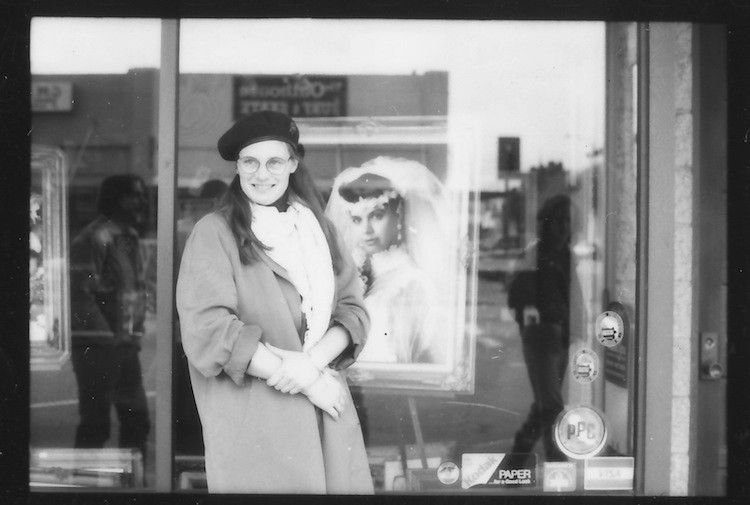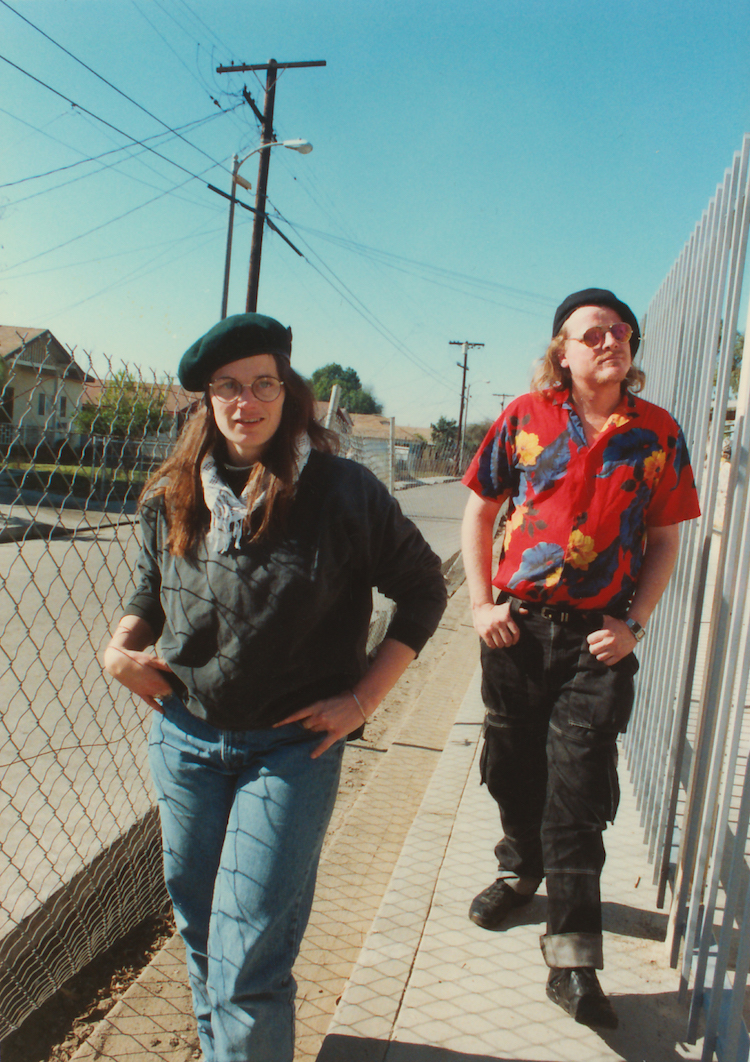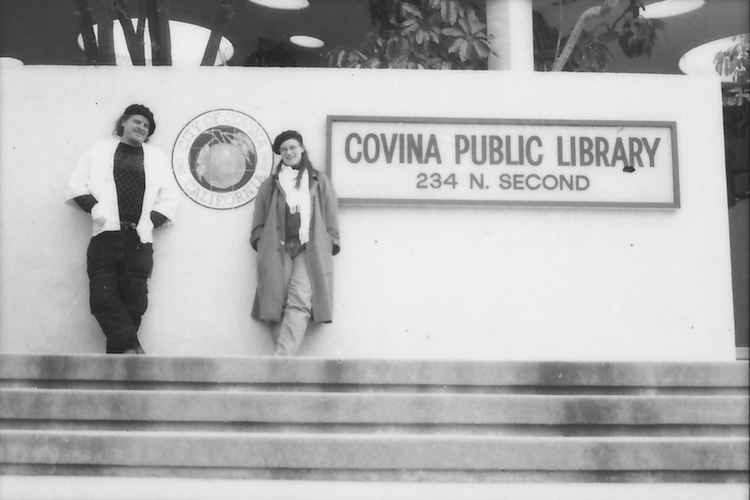Into the Zone
by Carrie Galbraith
I grew up in the suburbs of Los Angeles, in Covina, actually. A place of endless street grids; of same-looking ranch houses punctuated with train tracks and car dealerships. We had a large mall; one of the first of its kind – enclosed.
We would visit Clifton’s Cafeteria and shop for school clothes at the May Company. I learned to drive in the parking lot (on Sundays, when the mall was closed) in a friend’s three-speed Mustang, before I was actually old enough to take driver’s training. The mall had a theater and on the occasional Saturday, we were dropped off for the matinee. We’d sit through the organists’ recital and wait for the picture to appear on the big screen.
I had always known I was different. My idea of a good time was to read the World Book Encyclopedia, take photos with my Brownie Fiesta of what my cat was looking at out the window, or sneak out to the living room after everyone was asleep, and turn on the big black and white TV and tune in to the late-night movies.
Sometimes, on Friday nights, we would be allowed to get in our pajamas and then pile into our Country Squire and head to the local drive-In to listen to the tinny sounds of the latest movie from Disney or some other Hollywood studio. On special occasions, we dressed up, drove into LA, had dinner in Chinatown, and then went over to Hollywood where we would see a film at Grauman’s Chinese Theater or the Cinerama Dome on Sunset.
It was to the Cinerama Dome, one summer when I was eleven, where my parents brought us to see a new movie, one that had just been released. I sat quietly in my seat and let the film envelop me, not understanding a single frame, but knowing this was something bigger than me, than my family, than my brain had ever encountered The film was 2001: A Space Odyssey. And everything changed.
By the time I was seventeen, I had left American film behind to explore the black and white world of the European Cineaste. At nineteen, I discovered the cinematic wonders of the Soviet world and became familiar with Andrei Tarkovsky’s limited body of work. I would seek his films out in obscure midnight viewings on college campuses. I remember one hours-long drive to a UC campus to see his Ivan’s Childhood, as it had never had a west coast viewing.
Poetic Cinema, and the directors of the genre, became my raison d’etre. I gave up American and Western European film – taking Bergman’s quote to heart: “My discovery of Tarkovsky’s first film was like a miracle. Suddenly, I found myself standing at the door of a room the keys of which had, until then, never been given to me. It was a room I had always wanted to enter and where he was moving freely and fully at ease.” I felt encouraged and stimulated: someone was expressing what I had always wanted to say without knowing how.
Tarkovsky based Stalker on the novel Roadside Picnic, by Boris and Arkady Strugatsky. After discovering the film, I sought out the book and steeped myself in Zone lore. At the same time I was devouring Thomas Pynchon’s Gravity’s Rainbow, a book as much or more about The Zone but with the added, surreal “Pynchonesque” American aspect, in contrast to the somber inflections of the Soviet perspective.
When I discovered Cacophony, I found like-minded people and I embraced the Cacophony concept, as I understood it: that any idea can be brought to life and acted out. All events are valid, all alternate realities can be embraced and believed, all stretching of the boundaries between reality and imagination can be tested. I felt as if I could create worlds like the many I had seen on the big screen, and I could step into them and play with them and be part of them. I could create a believable reality out of a fictional concept, and interact with others inside of it. And what better fictional reality to explore than The Zone? That strange place of constantly shifting boundaries: unknown, tricky and dangerous—yet rewarding, with unexpected difficulties and surprises.
Phil Bewley (RIP)
One had to learn how to navigate The Zone. One needed to become a Stalker to lead others through the terrain, riddled with the potential for calamity and misplaced or misunderstood dreams. By the time the first Zone Trip came together, I had many events under my belt, as well as stints as Editor of Rough Draft. I was certain in my ability to conduct an “out of town” event. One night, either at an event or at a spontaneous event (many of those happened when we were all bored and nothing was in the newsletter for that week), I found out that a fellow Cacophonist, Phil Bewley, was from the same LA suburb. The first Zone Trip began that moment with the idea of entering this tiny, suburban enclave as a Zone: recording the findings, exploring the unimaginable secrets, and possibly finding the mysterious center where illusions were realized, or broken.
Our first arrival in The Zone happened at a gas station in LA County, somewhere just over the Grapevine. Driving all night, we took a moment for a pit stop. I noticed astro-turf in the “garden” area of the gas station. Moments later, I spotted a piece of car chrome, mangled and left on the side of the road to be forgotten. And I knew I had found the “key” to The Zone.
Zone Trip #4 Instructions
We drew a line in the dirty astroturf and held the key above our heads as we carefully stepped over the line and out of our real lives, willing ourselves to enter this alternate narrative, conscious of the fact that our reality would forever be changed. The Zone concept took hold and many other Cacophonists acted as Stalkers, leading intrepid explorers to other Zones.
Into the Zone became about finding that interesting place and going there with a complete belief in the journey as the message. A trust that the place will reveal the events that will unfold. The bleak playa of the Nevada desert, Mexico in search of fireworks and eclipses, other cities in which abandoned buildings needed exploring or normality needed a wake up call; all became Zone destinations. Because, simply put: The Zone is a place we reach inside ourselves, we bring it with us, we carry that constantly shifting, tricky, dangerous, and rewarding topography in our psyches. We are the Stalkers of our own forbidden terrain. See you there. “Well here he is, skidded out onto the Zone like a planchette on a Ouija Board, and what shows up inside the empty circle in his brains might string together into a message, might not, hell, he’ll just have to see…” – Gravity’s Rainbow, Thomas Pynchon




